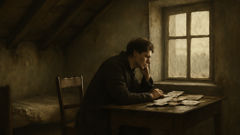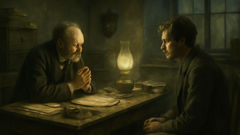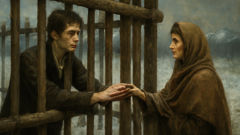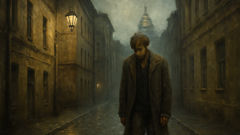Introduction
St. Petersburg in the mid-19th century is a city of blurred edges and stark contrasts, where the grandeur of palatial facades stands only a few paces away from crumbling courtyards and mud-streaked alleys. The Neva glimmers in the dusk, yet the city’s pulse throbs in the narrow lanes, the boarding houses, and the endless trudge of worn boots over cobblestones. In this cold, restless world, Rodion Romanovich Raskolnikov moves as a shadow—an ex-student, gaunt and haunted, his mind ever circling poverty, hunger, and the heavy burden of pride. Each day, he drifts past the pawnbroker’s door with his battered thoughts, his very existence a question mark against the indifferent city. His room is a cell of peeling wallpaper and stale air, the ticking of the clock echoing his own fevered reasoning: Why must the good suffer while the wicked prosper? Would the world not be better if it were swept clean of parasites? But behind such musings lies a storm of fear and conscience. Rodion is not merely hungry for bread, but for meaning—for a justification of his own worth, a spark to ignite him from passivity into action. The city, with its rain and grime, seems to press in around him. Old women haggle at market stalls; drunken men bellow in alleyways; distant bells toll, and the world remains indifferent. Yet beneath the endless sky, in the confines of his cramped quarters, Rodion hatches a plan. It is terrible in its simplicity: he will kill the pawnbroker, an old woman who preys on the desperate, and use her money to lift himself—and perhaps others—out of squalor. He tells himself it is for the greater good. He tries to believe he is strong enough to carry the weight of such a deed. The city offers no comfort, only opportunity and consequence. In St. Petersburg’s labyrinth of guilt and necessity, Rodion’s journey is about to begin.
I. Fevered Reasoning and the Weight of Poverty
Rodion’s garret on Srednyaya Street was little more than a cupboard under the roof, the ceiling sloping so sharply that he could barely stand upright near the window. Each day began with the same dull ache in his stomach and ended with the same churning in his mind. The city’s distant bells would mark the hours, but for Rodion, time passed in intervals of hunger and anxiety. His coat was thin and patched, his boots cracked; yet it was pride, not want, that pressed most cruelly upon him. He once believed himself destined for greatness—a scholar, a thinker, perhaps even a benefactor of mankind. But dreams crumble quickly beneath the weight of unpaid rent and the endless gaze of indifferent landlords.

He would walk the streets for hours, clutching the few kopecks he might scrounge for bread, avoiding familiar faces, always skirting the edges of respectability. The pawnbroker, Alyona Ivanovna, was a fixture in his world—a small, sharp-eyed woman whose apartment on the third floor reeked of mildew and vinegar. Her yellowed hands clutched at trinkets and torn clothing, always extracting more value than she gave. Rodion had brought her a battered silver watch once, and she’d smiled thinly as she pressed coins into his palm. There was something in her eyes that seemed to mock him: a knowledge of his desperation, a joy in his humiliation.
His thoughts grew darker with each passing day. Why should such a woman live while so many others—his mother, his beloved sister Dunya—struggled for every crumb? If she were gone, would the world not be improved? If one act of violence could wipe away so much suffering, was it not justified? He read essays and pamphlets, losing himself in arguments about great men and the morality of ends and means. "All is permitted," some said, if only one is strong enough to will it. Yet in the quiet of his room, Rodion’s heart raced with fear. He was not a monster. He recoiled from cruelty. But the city pressed in, and his resolve hardened.
He began to plan. He learned the old woman’s habits—the hours she kept, when her half-sister Lizaveta might be away, how the door was locked and bolted. He rehearsed his movements, practiced with an axe borrowed from a neighbor, told himself it was nothing more than an exercise in logic. Still, his dreams were filled with fever and blood. He saw his mother’s gentle face, Dunya’s determined eyes, the helplessness of friends like Razumikhin, who tried so hard to help, yet were powerless against fate.
On the appointed day, rain drummed steadily against the city’s rooftops. Rodion wrapped the axe in a rag and slipped it beneath his coat. He forced himself to walk calmly up the stairs to Alyona Ivanovna’s door, his mind racing with fragments of philosophy and terror. She answered, peering at him with suspicion. He smiled—a thin, desperate smile—and she turned her back to retrieve a promised item from the inner room. In that instant, his body seemed to act of its own accord. He stepped forward, raised the axe, and brought it down.
The deed was quick but not clean. There was blood—more than he’d imagined—and an overwhelming panic as footsteps sounded in the hallway. Lizaveta returned unexpectedly, her face frozen in horror. Without thinking, Rodion struck again. The world spun. He rummaged through drawers and boxes, hands shaking, stuffing coins and trinkets into his pockets. The clock ticked louder. The city’s heartbeat thundered in his ears.
Somehow, he stumbled down the stairs and out into the alley, unnoticed, unseen. Rain washed his face as he wandered the streets, numb and breathless. The crime was done. The city went on as before. But something in Rodion had shifted irrevocably—a fissure opening inside him, swallowing reason and hope alike.
II. Shadows, Conscience, and Pursuit
The following days passed in a haze, each hour stretching into eternity. Rodion hid the stolen goods under a loose floorboard in a deserted courtyard, terrified to spend even a single coin. Sleep eluded him; fever dreams tormented him with visions of blood and accusation. The city’s sounds—the clatter of hooves, the distant cries of street vendors—grew distorted and menacing. He imagined every passerby could see the stain on his soul.

Razumikhin came, cheerful and stubbornly loyal, urging Rodion to eat, to visit friends, to speak of plans for the future. But Rodion could barely meet his gaze. Every word felt like a lie; every kindness only deepened his shame. The police investigation began almost at once. Rumors spread through tenements and taverns: the old pawnbroker murdered in her rooms; her gentle half-sister struck down in terror; suspects questioned and released; a city holding its breath.
The inspector, Porfiry Petrovich, was a man of subtle wit and sharp eyes. He seemed to know more than he let on, questioning Rodion with a tone that was casual, even playful, yet pierced to the heart of things. Did Rodion believe in extraordinary men? Could a crime ever be justified for the greater good? Each conversation was a duel—a contest of nerves and philosophy. Rodion’s answers grew evasive, then defensive. He felt himself unraveling.
His mother arrived from the provinces, full of hope and trembling pride. Dunya came too, her beauty undimmed by hardship, her determination a rebuke to Rodion’s weakness. She had turned down the advances of her employer, Svidrigailov—a man whose wealth and corruption made Rodion shudder—but now faced the prospect of marrying the cold, ambitious Luzhin for the sake of their family’s survival. Rodion raged inwardly at the world’s injustice. His own crime seemed, for a moment, almost logical.
But guilt gnawed at him. He wandered the city at night, passing beggars and drunkards, haunted by Lizaveta’s wide, terrified eyes. He stumbled upon Marmeladov, a ruined civil servant who drank away his family’s last hope, and his daughter Sonya, who had turned to prostitution to keep them alive. Sonya’s gentleness pierced Rodion’s shell; her faith seemed irrational yet unshakable. She listened to his ravings without judgment, her compassion both balm and torment.
Porfiry pressed on. A witness had seen Rodion near the pawnbroker’s building; inconsistencies in his alibi mounted. Still, the inspector waited, as if certain that conscience would do his work for him. Rodion’s dreams grew darker—corridors without end, blood pooling beneath doors, voices whispering accusations in the dark. He fell ill with fever, drifting in and out of delirium as Razumikhin and his mother fretted at his bedside.
The city offered no refuge. Even as he avoided arrest, Rodion found himself imprisoned by fear. His crime isolated him from all he loved—from Dunya’s trust, Razumikhin’s friendship, Sonya’s hope. He could not confess, yet neither could he escape. The world closed in, as cold and indifferent as the city’s endless rain.
III. Confession, Suffering, and the Possibility of Redemption
Rodion’s soul churned restlessly between pride and horror. He avoided Sonya for days, unable to look her in the eye, but she sought him out again and again, sensing the torment that gnawed at him. Her room was a sanctuary of sorts—a single candle flickering on a chipped saucer, icons glowing faintly on the wall. She listened as Rodion raged against fate, against God, against himself. Her faith was unshakable, her compassion unearned.

One evening, driven to the brink, Rodion told her everything. His voice shook as he confessed—the planning, the blood, the terror and regret. Sonya wept silently, then pressed a battered New Testament into his hands. “Go and stand at the crossroads,” she whispered, “bow down, and say aloud: I am a murderer.”
For days he resisted. His mind rebelled at the thought of surrender. But Sonya’s words echoed inside him. At last, as snow began to fall on the city’s rooftops, Rodion wandered to a crossroads and knelt in the slush. He pressed his lips to the earth, then rose and walked to the police station. Porfiry awaited him there—not with triumph, but with a quiet nod of understanding.
The trial was brief. News of his confession spread quickly; the city buzzed with rumors and judgments. Some saw him as a monster, others as a madman. Only Sonya remained steadfast. She visited him in prison, her hope undiminished by bars or distance. Dunya and Razumikhin too offered what comfort they could, though Rodion struggled to accept forgiveness.
Siberia was vast and cold. The labor camp stretched endlessly over frozen ground, its barracks filled with men broken by hunger and regret. Rodion labored in silence, his heart still wracked by doubt. But Sonya followed him even there, settling in a village nearby, writing letters, visiting when permitted. Her love was patient; her faith unwavering. Gradually, Rodion’s heart began to thaw.
He watched the seasons turn—the snow melting into rivers, the rivers swelling into wild green fields. He saw the suffering of others and began, at last, to feel something like empathy. In quiet moments he remembered Sonya’s words and found solace in prayer—not for pardon from the law, but for peace within himself.
Years passed. The city that had once seemed so cruel receded into memory. In its place grew something softer: remorse, yes, but also hope. Rodion learned that suffering was not only punishment—it could also be a path to redemption. The world was still harsh, still indifferent, but within its cruelty there flickered a fragile grace.
He did not forget his crime. He did not forgive himself easily. But through Sonya’s love and his own slow transformation, Rodion discovered that the burden of guilt could be borne—and perhaps, in time, atoned.
Conclusion
St. Petersburg’s labyrinthine streets still echo with footsteps—of the desperate, the hopeful, the damned. Rodion Romanovich Raskolnikov’s journey through crime and punishment is not only the story of one tormented soul but a reflection of countless struggles fought in silence behind closed doors. In the end, the city remains unchanged: its grandeur and squalor endure side by side. Yet within one man—within the battered heart of Rodion—a transformation has taken root. The weight of guilt cannot be wished away or explained by logic; it must be endured, and through that suffering, new growth is possible. Redemption does not erase the past but softens its edges, allowing grace to find purchase even in hardened soil. Rodion’s fate is not a triumph, nor is it utter despair. It is the hard-won peace of a soul that has looked into darkness and chosen, with trembling hands, to reach for light.













